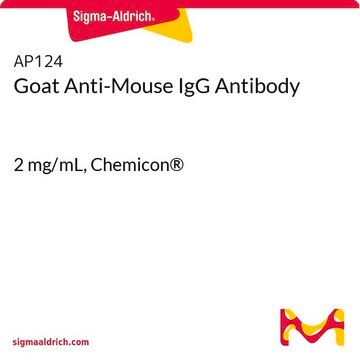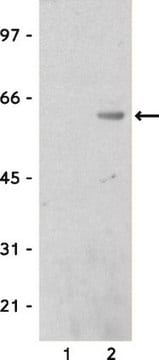07-632
Anti-NR2A Antibody
Upstate®, from rabbit
Synonym(s):
N-methyl D-aspartate receptor subtype 2A, N-methyl-D-aspartate receptor channe, subunit epsilon-1, N-methyl-D-aspartate receptor subunit 2A, NMDA receptor subtype 2A, glutamate receptor, ionotropic, N-methyl D-aspartate 2A
About This Item
Recommended Products
biological source
rabbit
Quality Level
antibody form
purified immunoglobulin
antibody product type
primary antibodies
clone
polyclonal
species reactivity
rat, mouse
manufacturer/tradename
Upstate®
technique(s)
immunoprecipitation (IP): suitable
western blot: suitable
isotype
IgG
NCBI accession no.
UniProt accession no.
shipped in
wet ice
target post-translational modification
unmodified
Gene Information
human ... GRIN2A(2903)
General description
Specificity
Immunogen
Application
4 µg of a previous lot immuno-precipitated NR2A from rat brain hippocampus membranes and rat brain microsomal preparations.
Neuroscience
Neurotransmitters & Receptors
Quality
Western Blot Analysis:
0.5-2 µg/mL of this antibody detected NR2A in rat brain microsomal preparations (Catalog # 12-144).
Target description
Physical form
Storage and Stability
Analysis Note
Brain tissue.
Other Notes
Legal Information
Disclaimer
Not finding the right product?
Try our Product Selector Tool.
recommended
Storage Class Code
12 - Non Combustible Liquids
WGK
WGK 1
Flash Point(F)
Not applicable
Flash Point(C)
Not applicable
Certificates of Analysis (COA)
Search for Certificates of Analysis (COA) by entering the products Lot/Batch Number. Lot and Batch Numbers can be found on a product’s label following the words ‘Lot’ or ‘Batch’.
Already Own This Product?
Find documentation for the products that you have recently purchased in the Document Library.
Our team of scientists has experience in all areas of research including Life Science, Material Science, Chemical Synthesis, Chromatography, Analytical and many others.
Contact Technical Service







